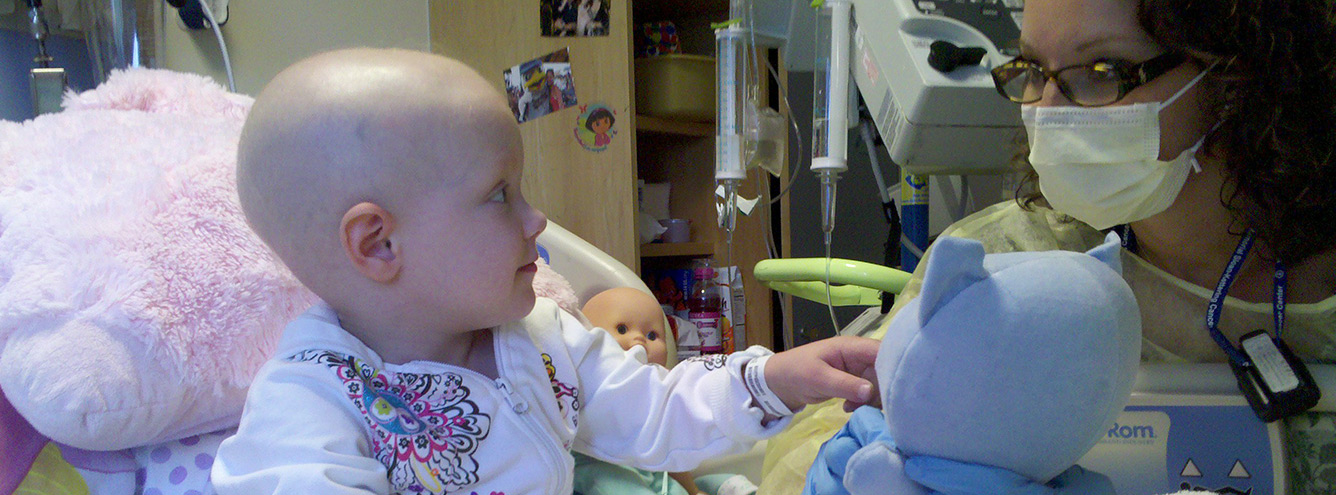Your child should be treated by an ophthalmologist and oncologist who work together to plan and deliver care.
When cancer is contained in the eye, the ophthalmologist (eye doctor) leads the medical team.
When cancer has spread outside the eye, the oncologist (cancer doctor) will lead the team.
Specialists in Retinoblastoma Care
Wherever possible, your child’s care should be led by a paediatric ophthalmologist / oncologist. These doctors specialize in caring for children.
Your child will usually be referred to a specific ophthalmologist with experience in treating children or eye cancer. At retinoblastoma centres of excellence, the ophthalmologist usually works with a specific oncologist. A general paediatric oncology centre may assign your child to the senior oncologist on call when your child is admitted.
Your nearest specialist retinoblastoma centre may be a long way from home, but it is vital your child be treated by doctors experienced in retinoblastoma. This is especially true if your child has bilateral, extraocular or trilateral retinoblastoma, or very small unilateral tumour/s.
Sometimes your child will be referred to the nearest paediatric oncology centre. This hospital may have an excellent reputation in treating children with cancer, and will likely be very able to remove an eye to save life. However, they may not have much experience with complex treatment such as eye salvage therapy, or chemotherapy for extraocular or trilateral retinoblastoma.
Questions to Ask the Doctors
Always ask the doctors to clarify what experience they have in treating children with retinoblastoma. Questions to ask include:
- Who is on your retinoblastoma team?
- How many children do you treat each year with unilateral/bilateral Rb?
- What treatments do you offer?
- What is your success rate in saving eyes/sight?
- Have any of your patients had extraocular spread after eye salvage?
- Do you consult with other retinoblastoma specialists? Who are they?
- Will you consult other retinoblastoma specialists about my child’s care?
- Do you use photos or eye scans to support virtual consultation?
- Will you show these photos to me to help me understand my child’s cancer?
- Is there time to get a second opinion without significant risk to my child?
- Do you have Child Life Specialist support in both oncology and ophthalmology?
- Is there a comparable Rb centre closer to home, or a more appropriate centre?
Identifying the Best Medical Team
You do not have the luxury of time in choosing your child’s doctors, especially if the cancer is advanced. Treatment must begin promptly to protect your child’s life, or give the best chance of saving sight if that is possible. However, you can take steps to ensure your child is receiving care from an appropriate team.
Most doctors who treat children with retinoblastoma are deeply caring, dedicated to their work and young patients, and very experienced. Here are the most important things to expect from your child’s doctors:
- Board certified in ophthalmology or oncology
- Always puts the interests of your child first
- A good rapport with you and your child
- Respectful and honest communication
- Compassion when delivering difficult news
- Clear, easy-to-understand explanations
- Open to your questions, freely offering clear answers
- Excellent medical skills
- Shares results of all tests and explains them to you
- Encourages you to be involved in decision making
- Collaborative, and open to second opinions
- Respects your wishes
To find a retinoblastoma specialist centre, use the One Retinoblastoma World Map or contact us.
The One Retinoblastoma World map brings together details of specialist treatment centres around the world, including patient numbers, team members, available imaging and treatments, and contact details. Some established treatment centres are not included on the map as they have not submitted their data.
Refusing Procedures / Treatment
If you choose not to consent to a particular procedure or treatment, you do not have to give a reason. However, explaining your reasons to the doctor or nurse can help them understand your concerns so they can give the best advice to protect your child.
You have the right to refuse treatment, but if the doctors feel this puts your child’s life at risk, they can request a court order for treatment. Your child’s welfare is paramount. If legal intervention is sought, both you and the doctors will have the opportunity to share your concerns.
Do Not Delay Vital Care
Retinoblastoma is an aggressive cancer and delaying treatment for a long time will put your child’s life at risk. While exploring treatment options and seeking a second opinion is common, do not delay prompt treatment if your child already has signs of very advanced or dangerous disease:
- The optic nerve is not clearly visible during EUA.
- A collapsed or shrunken eye (phthisis bulbi).
- High eye pressure (glaucoma).
- Bleeding in the front of the eye (hyphema).
- Infection in the eye socket (orbital cellulitis).
These are all signs that cancer is at high risk for spread outside the eye, a serious threat to the child’s life.


